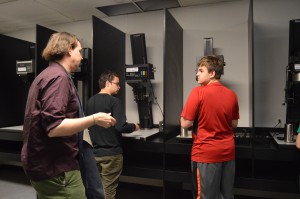By Ellen Madden – 10th Grade, Moon Area High School
Shooting videos has always been a short and easy process for kids of my generation. Growing up around digital cameras and cell phones with built-in cameras, it’s hard to imagine a time when recording a video took more than a few seconds of work. At Pittsburgh Filmmakers, teens ages 14-18 who are interested in filmmaking have the unique opportunity to learn how to create movies with film. Yes, that’s right: actual film.
At the Handmade Filmmaking Camp, which ran from August 3 to August 7, a group of teens learned the methods of filming, processing, and digitally editing film. The first two days were spent learning about the history of film and the chemical process, which stabilizes the image and removes the unexposed silver halide remaining on the photographic film which leaves behind the reduced metallic silver that forms the image, making it insensitive to light.
To test their new skills, the group first created a short film. They collected leaves, flowers, and rocks from outside, and in the darkroom at Pittsburgh Filmmakers, they laid out the objects on the roll of film while someone flicked the lights on and off. They then processed the film and watched it. The film, while a bit short, looked good with only a few blank patches. The teens learned just how hard developing film really is.
After the trial run, the students started work on their main projects. They were split into two groups to each create seven-minute short films, and they spent the first day recording the video for their pieces. None of the film had any sound, I was told by one of the girls.

Two teens getting ready to develop the film
The day after they recorded, they processed the film. Before they could process it though, they had to go to the dark room and put the film in a different container. They had to do this in complete darkness because the film is extremely light-sensitive.
We then went to another room where the students chemically processed the film. When asked about the process, Ian, one of the teens said, “It’s like cooking, but smells worse.”
When the process was done and the students thoroughly cleaned the film and hung it up to dry. They had to wait until the next day to edit and watch the films.
While the whole process seemed like a lot just for a seven minute clip, none of the teens seemed dissatisfied in the end. Talking to them, I learned that many of them saw film as being more “aesthetically pleasing” than digital. According to many of of the students, the look of traditional film cannot be replicated with digital editing.
The teens in this program each got a copy of the film they made and earned the digital badge for “Editing” from Pittsburgh City of Learning. The digital badge helps teens keep track of what they learned while completing City of Learning programs, and it may come in handy when applying for college or a new job.
 Ellen Madden is a sophomore at Moon Area High School. She enjoys photography, music, and theatre. She hopes to gain more experience in media and journalism with Pittsburgh Youth Media.
Ellen Madden is a sophomore at Moon Area High School. She enjoys photography, music, and theatre. She hopes to gain more experience in media and journalism with Pittsburgh Youth Media.
Leave a Comment